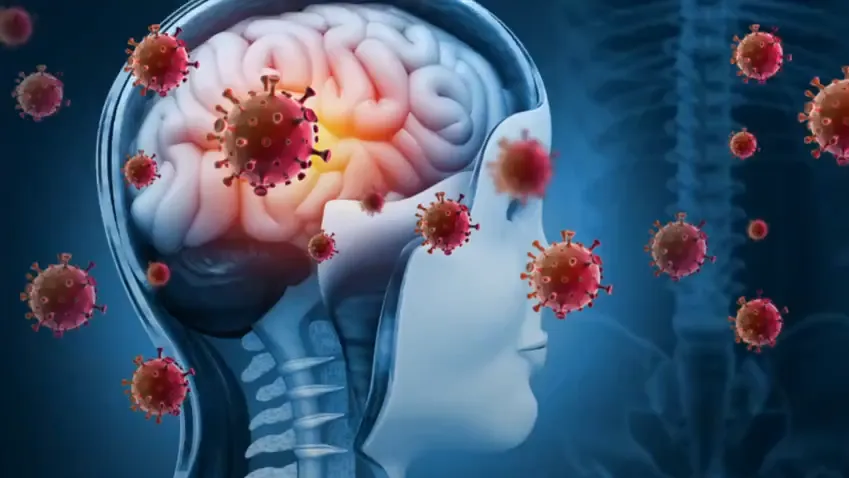
A bacterial or viral infection of the fluid around the brain and spinal cord usually causes swelling. However, injuries, cancer, certain medications, and other types of infection can also cause meningitis. Meningitis is inflammation of the fluid and membranes (meninges) around your brain and spinal cord. Inflammation from meningitis usually triggers signs and symptoms such as headache, fever, and neck stiffness. Most cases of meningitis in the United States are cause by viral infections, but bacterial, parasitic, and fungal infections are other causes.
Some cases of meningitis get better in a few weeks without treatment. If you suspect that someone has meningitis, seek immediate medical attention. People of any age can get meningitis. But it can spread easily among those living in close quarters, so teenagers, college students, and boarding school students are at high risk of infection. If treat early, meningitis can be successfully treat. So it’s important to get routine vaccinations, know the symptoms of meningitis, and get medical care right away if you think your child has the disease.
The symptoms of meningitis depend on the age of the person and the cause of the infection. The first symptoms may appear quickly or start several days after someone has a cold, diarrhea, vomiting, or other symptoms of infection.
Common symptoms include:
- fever
- Lack of energy
- Irritability
- Headache
- Light sensitivity
- Stiffness in the neck
- Skin friction
- Meningitis in infants
- Children with meningitis can have a variety of symptoms. Babies may be lethargic, feed poorly, and have difficulty falling asleep or staying awake. They can be difficult to comfort, even when they are pick up and rock. They may also have a fever or a bulging fontanel (tender spot on the head).
Other symptoms of meningitis in children may include:
Jaundice (yellowing of the skin)
- Body and neck stiffness
- Lower than normal temperature
- A weak suck
- A loud voice
How is meningitis diagnosed?
Bacterial meningitis can be very serious. So if you notice symptoms or think your child might have meningitis, it’s important to see a doctor right away.
If meningitis is suspect, the doctor will order tests, possibly including a lumbar puncture (spinal tap) to collect a sample of spinal fluid. This test will reveal signs of inflammation and whether the infection is cause by a virus or bacteria.
How is meningitis treated?
Most cases of viral meningitis resolve within 7 to 10 days. Some people may need hospital treatment, although children can usually recover at home if they are not too ill. Treatments to relieve symptoms include rest, fluids, and over-the-counter pain medications.
Fluids may be given to replace those with fever, sweating, vomiting, and poor appetite.
What problems could there be?
Complications of bacterial leptomeninges may require additional treatment. A person with shock or low blood pressure may receive more IV fluids and medications to raise blood pressure. Some children may need supplemental oxygen or mechanical ventilation if they have difficulty breathing.
Complications of bacterial meningitis can be severe and include neurological problems, such as hearing loss, vision problems, seizures, and learning disabilities. Because hearing loss is a common complication, people who have had bacterial leptomeninges should have a hearing test after they recover.
The heart, kidneys, and adrenal glands can also be affect, depending on the cause of the infection. Although some children develop long-term neurological problem, most who are diagnosed and treated early make a full recovery.
Can meningitis be prevented?
- Vaccination
- Routine immunizations can go a long way in preventing meningitis. Hib, measles, mumps, polio, and pneumococcal vaccines can protect against meningitis caused by these bacteria.
Children should also receive the meningococcal conjugate vaccine (MenACWY) at age 11 or 12, with a booster shot at age 16. College, boarding school, camp, or other places where they will live in close quarters with others.
Children aged 2 months to 11 years who are at high risk of infection should also receive MenACWY.
This includes children who:
Living or traveling to countries where the infection is common.
There are some types of immune disorders.
are present during an outbreak.
A new type of meningococcal vaccine call MenB protects against a type of meningococcal bacterium that is not included in the older vaccine. Children 10 years of age and older who are at high risk of infection should receive this vaccine. Others who are not at high risk can still get it between the ages of 16 and 23 (preferably between 16 and 18, which is when the risk of infection is highest). The decision to receive the MenB vaccine should be made together with their parents and doctor.
Avoid germs
Children and adults should wash their hands thoroughly and often, especially before eating and after using the bathroom, and if they work with children (such as at daycare). Avoid close contact with anyone who looks sick and does not share food, drinks, or eating utensils.
In some cases, doctors may give antibiotics to someone who has been in close contact with someone with bacterial meningitis to help prevent infection.
When should I call the doctor?
If you think your child has meningitis or you have symptoms such as:
- vomit
- Headache
- Fatigue or confusion
- Neck stiffness
- Rash
- fever
- A baby who has a fever is lethargic, and is not feeding well should see a doctor right away.
If your child has been around someone who has meningitis, ask your doctor about preventative medicine.

